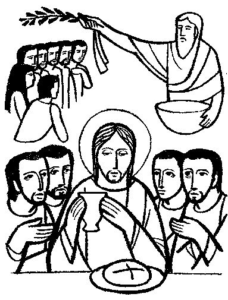 The way in which we celebrate the Eucharist today is steeped in a tradition that is described in today’s first reading from Exodus, although you may not initially recognize it in the somewhat gruesome details of the story.
The way in which we celebrate the Eucharist today is steeped in a tradition that is described in today’s first reading from Exodus, although you may not initially recognize it in the somewhat gruesome details of the story.
Moses builds an altar and gathers together the newly liberated Israelites. Representatives of the twelve tribes of Israel are invited to bring sacrifices for the burnt offering. Blood from these sacrificed animals is collected, some of which Moses sprinkles on the altar which represents God. Moses then reminds the people of all that God has done for them since the beginning of time and reads from the book of the covenant, the laws that God has given to them. The people listen closely and speak aloud their acceptance and commitment to God and his commandments. As a seal upon this new covenant between God and his people, Moses then takes the remaining blood and sprinkles it on the people. The people then celebrate in thanksgiving and share a meal of the burnt offerings to solidify their bond with God and each other.
The people of Moses’ time may not have had our modern understanding of human anatomy, but they knew that that when any living creature shed too much blood, its life would be lost. In Hebrew ritual and tradition, therefore, it was understood that the life of any being resided in its blood. Taking the blood of an animal was an act of finality and its “life-blood” was used to signify a bond of “life” between God (the altar) and God’s chosen people.
All of this symbolism would have been understood by the Jewish disciples of Jesus as they celebrated the Passover meal. After all, the Passover meal was the celebration and renewal of that original covenant with Moses. They would have understood Jesus’ reference to himself as the “sacrificed lamb” whose blood was to be the blood of a new covenant. This new covenant would cleanse humanity, as St. Paul writes to the Hebrews, “from the transgressions under the first covenant,” so that a fresh, new relationship between God and his people could begin.
Just as Jesus’ disciples were celebrating the covenant of Moses at Passover, we too, celebrate and renew the covenant made at the last supper of Jesus before his sacrifice and death each time we share in a Eucharistic meal. When we give thanks and then share in the body and blood of Christ, we take into ourselves the “life-blood” of Christ, allowing it to renew and transform us into a deeper relationship with God. To use a modern expression, “we become what we eat!” so that we become the voice, the hands and the heart of Christ for the world. Like the people of Moses’ time, we voice our consent to this new covenant when we say, “Amen!” (I believe) before we “take and eat,” and “take and drink.” Each Eucharistic meal that we share, strengthens our bond to God and to each other.
As one of our communion songs proclaim, “Come join the feast! Take and believe! Become what you receive!”
Mary Joshi
31
MAY
2018
MAY
2018

About the Author: